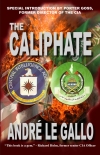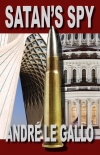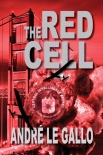The Caliphate by André Gallo (booksvooks .txt) 📗

- Author: André Gallo
Book online «The Caliphate by André Gallo (booksvooks .txt) 📗». Author André Gallo
They moved to the living room. Large windows overlooked a patio and pool, and the beach and the Mediterranean below. The inside walls offered a neutral cream backdrop for paintings on loan from the State Department’s American Art in Embassies program. Alexandra had chosen a large painting by Bruce Marden, colorful lines on a white background, several smaller works by Marsden Hartley, including one called “Blue Hills,” and another modern work by Joan Mitchell.
Marshall put his glass down.
“What’s the reporting from Damascus, Jack?”
“The events triggered by al Khalil have given a young set of leaders the momentum to pressure Bashir Assad either to step down or to clean house. We know little about the impact in Iran, since we have no embassy in Tehran. In any case, the gains of the Muslim Brotherhood of the last couple of days have been turned around. But, the previous governments are not back in charge either. New leadership seems to be emerging.”
Marshall, who had earlier disclosed to Hastings that he occasionally did work for the agency and therefore still had his clearances, said, “An Iranian counterattack was imminent. The Islamic Revolutionary Guard Corps took over after the laser attack killed the country’s top leadership. General Safavi was on the verge of launching his Shahab-3 missiles against Israel. After all, if the attack came from Israel, it was evident to the Iranians that the Israelis were only using al Khalil’s name as a cover for their attack on Tehran. That was the Iranian thinking anyway. But cooler heads prevailed.”
Marshall adjusted his sling and moved his left arm into a more comfortable position.
“There’s more. The Iranian president was killed. He was in an open-top limousine coming back to his office from some sort of public event, a parade I think, when the laser struck Tehran. Apparently the heat of the laser made the car’s gas tank explode, probably more due to something about the car than due to the strength of the laser, I’m guessing. Couldn’t have happened to a nicer guy!”
A maid brought coffee. As she poured, Jack Horton was let in by a security guard.
“I just had a meeting with Israeli intelligence, and I thought you’d want to hear this, Mister Ambassador.”
Hastings invited him to come in and asked Marshall to stay. Alexandra left the room.
“The Israelis have debriefed the Rafael employees and interrogated the terrorists. Each side states the laser attacks could have caused many more casualties. But both the terrorists and the Israeli scientists seem to want credit for the moderation. Habib, al Khalil’s Ph.D.—he was educated in the U.S., by the way—is the one who figured out the weapon and fired it. He claims that he thought al Khalil’s orders were too inhumane, that he, Habib, had never signed on to commit mass murder. So, although he had no choice but to do as he was told, he said, he dragged his feet to delay the second strike.
“Eventually, as we know, Steve made his escape and stopped the second strike from taking place. We got a similar but not identical story from debriefing the Israeli scientists. One couple in particular—they’re husband and wife—said that when they were forced to tell this fellow Habib how the weapon functioned, they intentionally misinformed him about the power settings.”
“I’m not surprised,” Marshall said. “Human nature at work. Al Khalil’s attack has changed the politics of the entire Middle East. We’ll be sorting out the positive from the negative for a long time.”
Hastings stirred his coffee.
“You’re right. This provides a window of opportunity that we need to exploit quickly. Governments from Marrakech to Bangladesh must give their people the hope they now get only from the extremists. Then the Salafists’ base, their recruitment pool, will disappear.”
Marshall turned toward Hastings.
“You’re being an optimist. That is not going to be their first priority; short-term survival, clinging to power, is going to trump your program. The first step the Arab governments will take is to try to do away with the Israeli weapon. They can’t do it by force of arms, so they’ll want to neutralize it through some sort of international weapons disarmament, or try to make it an illegal weapon, like gas warfare after World War I.
“This is a wakeup call,” he added. “I hope al Khalil’s attack will have convinced the world that the Salafists are serious and are playing for keeps. These are not people who want to negotiate.”
Alexandra returned to the living room and sat down.
“Kella has been through a terrible nightmare. She needs to stay here and decompress for a while. What about Steve, what are his plans?”
Marshall shrugged and said, “I suppose he’ll go back to work, but we haven’t had a chance to talk yet. I honestly don’t know.”
***
Kella stepped into Steve’s room at the Ichilov Hospital of the Tel Aviv Medical Center and, before she could speak, Steve said, “Hey, look at this. They’re talking about my departed schoolmate,” pointing at the television suspended over the bed.
The speaker was a historian from the Jaffee Center of Strategic Studies.
“The history of warfare has progressed via a series of epoch-defining developments in weaponry and technology. The stirrup, probably developed by the Chinese sometime during the first few centuries A.D., gave mounted horsemen the stability to wield weapons with longer reach and range, using the horse as the first true weapons platform. Later, the hand crossbow was so lethal that Pope Innocent II forbade its use





Comments (0)